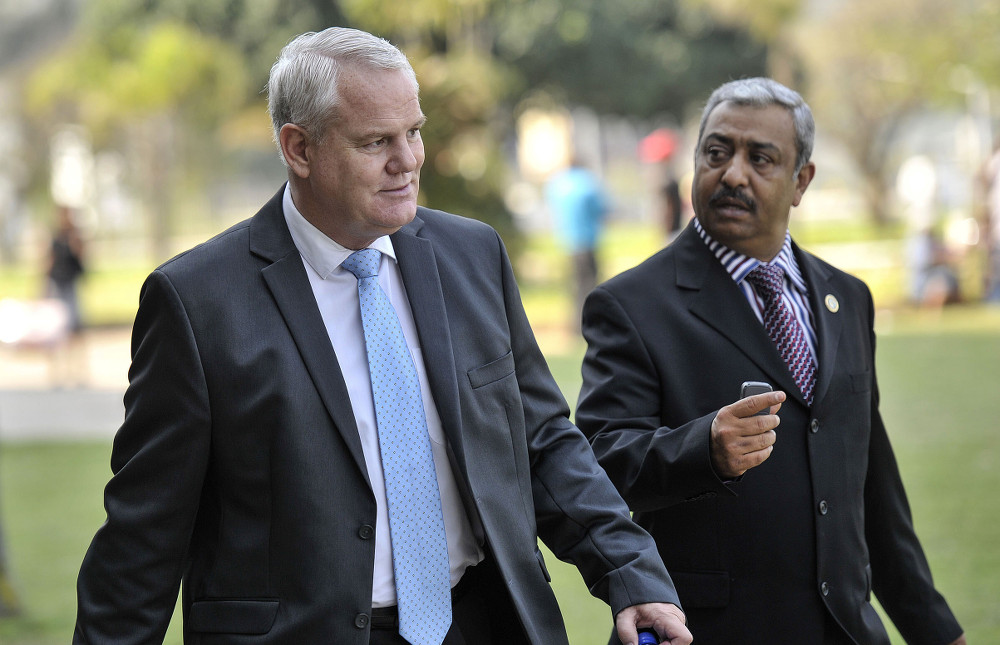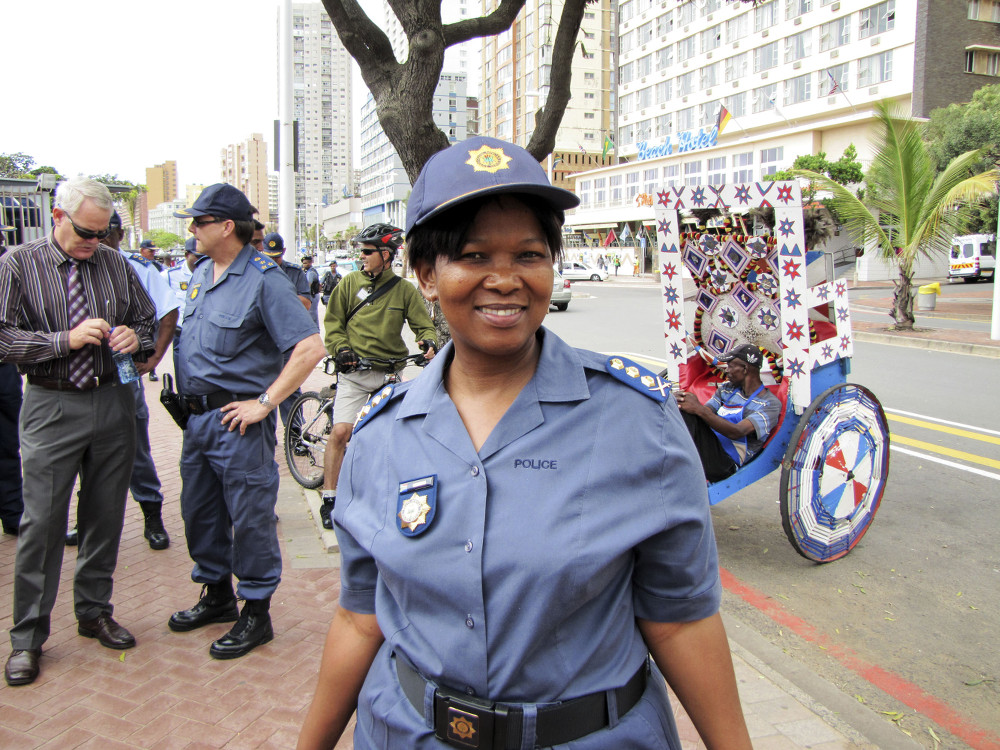Businessman Thoshan Panday. (File photo)
NEWS ANALYSIS
Documents reveal the astounding legal contortions two KwaZulu-Natal prosecutors adopted to justify terminating bribery and corruption charges against Durban businessman Thoshan Panday.
The documents suggest the decisions were marked by lapses in law, logic and evidence – raising questions about whether they were taken in good faith. They also raise concerns about the suitability for office of the more senior of the two prosecutors, provincial director of public prosecutions Moipone Noko.
Since 2010 Panday has shrugged off four separate charges. His relationship with members of the Zuma family – he has been in business with Jacob Zuma’s son, Edward, and the president’s cousin, Deebo Mzobe – has been offered as an explanation for his seemingly charmed legal existence.
Noko’s decision to stop the pro-secution of Panday and police supply chain manager Colonel Navin Madhoe for allegedly attempting to bribe provincial Hawks boss Major General Johan Booysen was the subject of a review process initiated by former national director of public prosecutions Mxolisi Nxasana.
Nxasana ordered a review of the Noko decision following a stinging letter from Booysen in November last year in which Booysen lambasted Noko’s formal memorandum setting out her reasoning.

(Major General Johan Booysen Photo: Gallo Images/City Press/Khaya Ngwenya)
Anwa Dramat, then commander of the Hawks, and Independent Police Investigative Directorate (IPID) boss Robert McBride also asked Nxasana to review his junior’s decision.
In his letter, Booysen told Nxasana: “This missive from the office of the DPP KwaZulu-Natal … is permeated with conjecture, innuendo, inaccuracies and, in certain instances, blatant untruths. Her assertions are an aberration which lacks substance supported by credible evidence.”
Booysen is no disinterested observer: he is fighting for his professional survival and has made thinly veiled references to being targeted directly as a result of his involvement in investigating Panday.
But a legal expert, who asked not to be named, concurred with Booysen’s assessment of Noko’s memo. The man, a senior constitutional lawyer, said: “It’s an appalling document; the whole situation is a cesspool … the moment anyone raises any resistance to what’s happening in KZN, be they Dramat, Booysen, Nxasana or others, they get suspended.”
Noko told amaBhungane: “I am not concerned about what is being alleged by whoever, as you indicate, as I have my reasons based on a notion of prosecution towards revelation of truth and justice, and I stand by my decision.”
Booysen is fighting his fourth suspension and Nxasana’s review process appears to be in limbo following his replacement by Shaun Abrahams as public prosecutions director.
Nxasana appointed senior Gauteng prosecutor Gerrie Nel to re-examine the Panday case, but Abrahams has reportedly terminated Nel’s jurisdiction.
Abrahams’s office refused to comment on claims that Nel had re-commended that both Panday and KwaZulu-Natal police commissioner Mmamonnye Ngobeni be re-charged.
The semantic and factual maze produced by Noko cannot be understood without considering the extraordinary history of the Panday matter – and an earlier, equally mystifying decision by her colleague, advocate Abram Letsholo.
Read:
Panday was first investigated under case 781/06/2010, which alleged that he had conspired with Madhoe, a procurement officer at police headquarters in Durban, to defraud the South African Police Service by inflating a R60-million contract to supply temporary accommodation for police members in KwaZulu-Natal during the 2010 Fifa World Cup.
Later, Panday was arrested in case 466/09/2011 after he allegedly offered Booysen a R2-million bribe to backdate a report – possibly creating the impression that before obtaining subpoenas, the police gained illegal access to Panday’s bank accounts.
Central to the decisions by both Noko and Letsholo were allegations by Panday after he discovered his electronic communications had been monitored since 2010.
He was arrested in September 2011. More than a year later, he signed a dramatic affidavit claiming that shortly before his arrest there had been an attempt to blackmail him using intercepted material.
He also complained to the inspector general of intelligence about “unauthorised interception” and of “threats” directed at him.
In his affidavit, Panday described how, in early September 2011, just after the alleged attempt to bribe Booysen, he was lured to a meeting with provincial head of crime intelligence General Deena Moodley.
Read:
He alleged that Moodley referred disparagingly to Ngobeni, saying: “I need to get rid of this black bitch commissioner and I need your assistance,” before playing him recordings of a number of conversations he had had with businesspeople – including Edward Zuma – politicians, his attorney and the KwaZulu-Natal commissioner.
“Conversations I had had with various female acquaintances were also played to me and General Deena Moodley threatened to reveal these to my wife should I refuse to co-operate with him,” Panday stated.
Somewhat implausibly, Panday alleged he was also played conversations with his attorney and that Moodley conveniently incriminated himself by stating: “Now that we know what defences you will use I will make sure that all those avenues are closed to you.”

(KZN police comissioner Mmamonnye Ngobeni. Photo: Courtesy City Press)
The claims, if true, could conceivably have justified a decision to weigh up whether the charges against Panday were compromised. Indeed, they form the only real basis for the decisions by Letsholo and Noko to abandon the prosecution. Yet Moodley and his colleagues strenuously deny that they played Panday any recordings – and their version has never been tested against his claims.
Moodley has been on forced “special leave” for nearly two years. As far as could be established, no charges relating to the Panday allegations have ever been brought against him.
His three subordinates were suspended, but they were recently ordered to be reinstated after the South African Police Service failed to produce disciplinary charges for nearly a year.
AmaBhungane has seen evidence showing that a judge’s authorisations were obtained for the police interceptions of Panday. They were first initiated because of alleged threats to the investigating officers and renewed on multiple occasions by two different judges.
Panday’s complaint to the inspector general of intelligence was finalised more than two years ago, but the intelligence office referred amaBhungane to Panday.
He in turn declined to divulge the outcome of the investigation, raising doubts about whether it supports his claims. Panday said: “Please note that I do not propose to reply to your mail below as it is very apparent to me … that you are working toward a hidden agenda with certain individuals.”
Letsholo, the Specialised Commercial Crime Unit (SCCU) prosecutor who quashed the original World Cup fraud charges, penned his own memorandum.
It shows that he simply accepted Panday’s allegations as true, without making any effort to have them investigated. He also makes no attempt to analyse how the allegations affect the R60-million fraud claim, but simply asserts: “The evidence as it stands at this point is irredeemably stained … I have therefore taken a decision to decline to prosecute in this matter.”
To gain some understanding of how Letsholo’s conjecture was seized on by Noko to justify her own decision, a passage from Noko’s memorandum abandoning the bribery charges will suffice.
She writes: “Case 781 [the WC fraud] was dealt with by the SCCU in Durban and disposed of recently with a decision not to prosecute anyone as there was no evidence to prosecute any person with any offence.
“It has been revealed by the SCCU that the SAPS members who were charged with the investigation of this 781 case were gunning for the prosecution of a specific person [KZN SAPS Provincial Commissioner Lieutenant General Ngobeni] and Mr Panday and Colonel Madhoe were being pressurised to falsely implicate her in the commission of criminal offences, with a promise that they will be exonerated in 781.
“When the SAPS investigators realised that the PC [provincial commissioner] cannot be charged in this case (781), simply because there is no evidence against her, one I/O [investigating officer] reportedly said that the SCCU prosecutor may as well just close this 781 case. It appears [that]Mr Panday and Colonel Madhoe featured nowhere in the 781 then as the focus was on the PC.
“One then may ask a question, why was Colonel Madhoe arrested in case 466 [the bribery case]? Was this a lawfully justified arrest or was it a way to pressurise him to implicate the PC … ?”
Booysen’s response is strained.
He charges: “The tenor and tone of advocate Noko’s contentions appears to be that of a defence counsel rather than that of a prosecutor … it would appear that advocate Noko is usurping the function of the courts.”
Additional reporting by Sally Evans
* Got a tip-off for us about this story? Click here.
 The M&G Centre for Investigative Journalism (amaBhungane) produced this story. All views are ours. See www.amabhungane.co.za for our stories, activities and funding sources.
The M&G Centre for Investigative Journalism (amaBhungane) produced this story. All views are ours. See www.amabhungane.co.za for our stories, activities and funding sources.